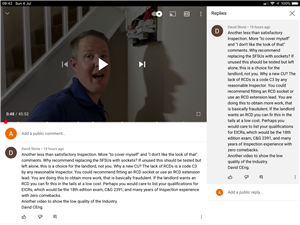I am interested in comments from anyone on the youtube videos, there are several purporting to show EICR procedures. As most know I am currently researching this, and am collecting data.
https://www.youtube.com/watch?v=RzdQ4kH1G6M
https://www.youtube.com/watch?v=wIlwmp7Ks2w
are of particular interest, ignore any comments I may have left, I want your comments.
Kind regards
David

